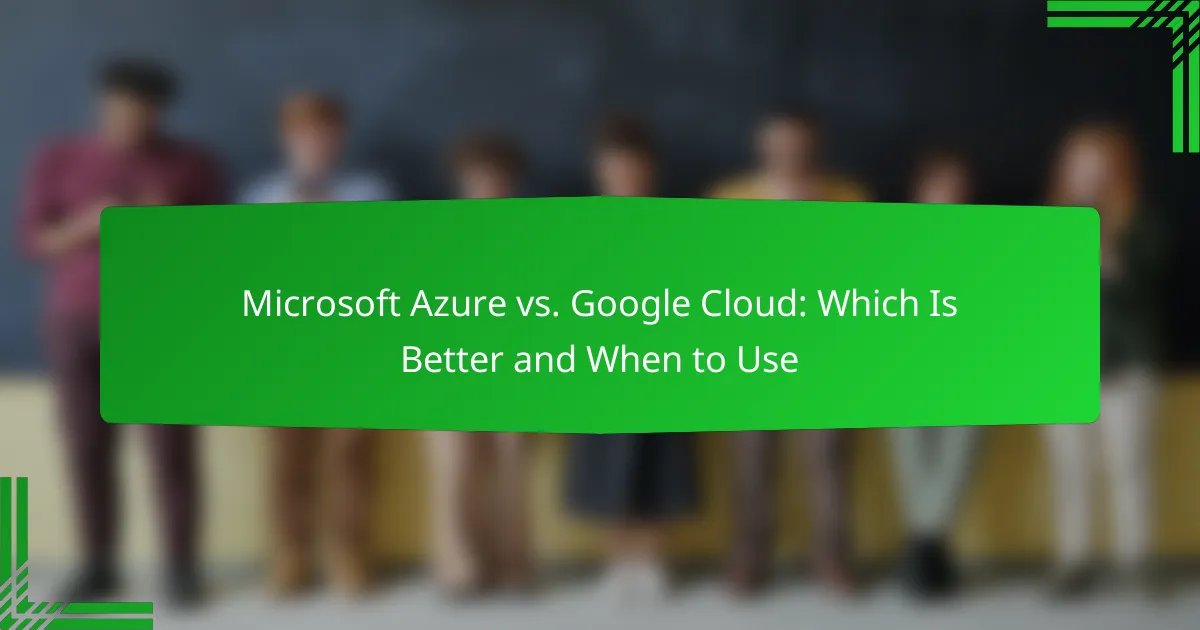When comparing Microsoft Azure and Google Cloud, it’s essential to recognize their distinct strengths and offerings. Azure is particularly advantageous for organizations that depend on Microsoft products and seek robust enterprise solutions, while Google Cloud excels in big data and machine learning applications, making it ideal for startups and innovative projects. Understanding these differences can guide businesses in selecting the most suitable cloud provider for their unique requirements.
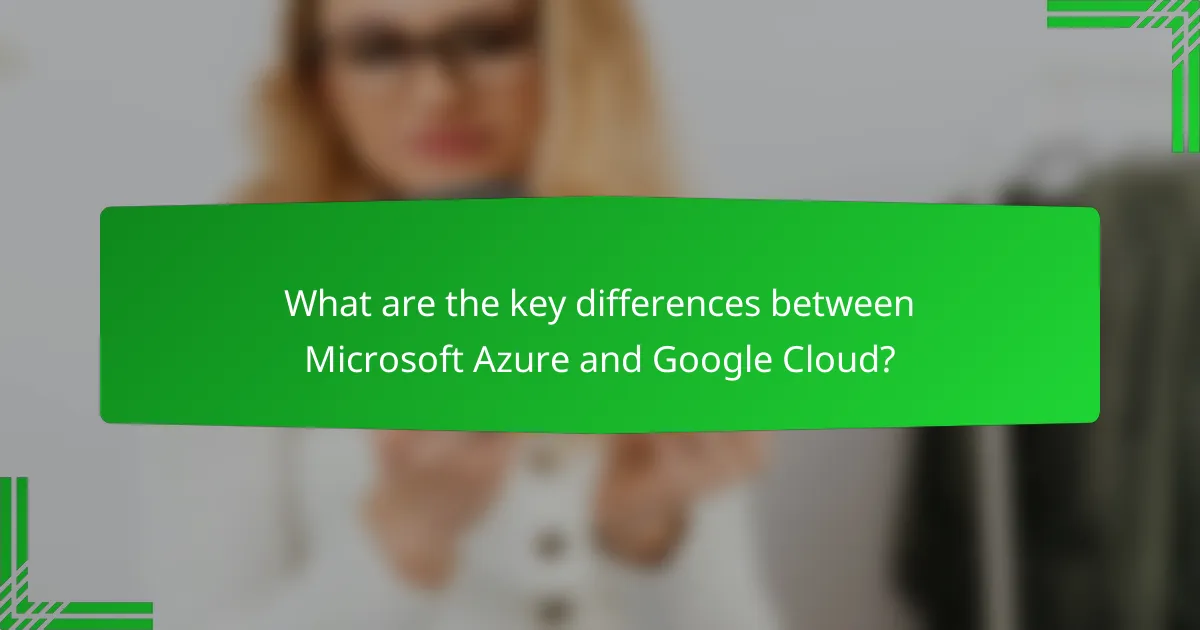
What are the key differences between Microsoft Azure and Google Cloud?
Microsoft Azure and Google Cloud differ significantly in their service offerings, pricing structures, and performance metrics. Understanding these differences can help businesses choose the right cloud provider based on their specific needs and use cases.
Service offerings comparison
Microsoft Azure provides a broad range of services, including virtual machines, app services, and extensive support for enterprise applications. It is particularly strong in hybrid cloud solutions, making it ideal for businesses that require on-premises integration.
Google Cloud, on the other hand, excels in data analytics and machine learning services. Its BigQuery and TensorFlow offerings are popular among organizations focusing on data-driven decision-making. Each platform has unique strengths, so the choice often depends on the specific requirements of the project.
Pricing structures
Azure typically employs a pay-as-you-go pricing model, allowing users to pay only for the resources they consume. This can be beneficial for businesses with fluctuating workloads, as it provides flexibility in budgeting.
Google Cloud also offers a pay-as-you-go model but includes sustained use discounts that automatically lower prices for long-running workloads. Evaluating the pricing structures based on projected usage can help organizations optimize costs effectively.
Performance metrics
Performance can vary between Azure and Google Cloud based on the specific services used. Azure generally offers robust performance for enterprise applications, while Google Cloud is known for its speed in data processing and analytics.
Market share analysis
Microsoft Azure holds a significant share of the cloud market, often ranking second behind Amazon Web Services. Its strong presence in enterprise environments contributes to its popularity among large organizations.
Google Cloud, while smaller in market share, has been rapidly growing, particularly among startups and tech companies. Its focus on innovation and advanced data services attracts businesses looking for cutting-edge solutions. Understanding market trends can help organizations align their cloud strategy with industry movements.

When should I choose Microsoft Azure?
Choose Microsoft Azure when your organization heavily relies on Microsoft products or requires robust enterprise-level solutions. Azure excels in hybrid cloud capabilities, making it ideal for businesses looking to integrate on-premises infrastructure with cloud services.
Integration with Microsoft products
Microsoft Azure offers seamless integration with a range of Microsoft products, including Office 365, Dynamics 365, and Windows Server. This compatibility allows businesses to leverage existing Microsoft licenses and infrastructure, reducing the learning curve and enhancing productivity.
For example, companies using Microsoft Teams can easily connect to Azure services for enhanced collaboration and data management. This integration streamlines workflows and enables smoother transitions between applications.
Enterprise-level solutions
Azure is designed to support large-scale enterprise needs, offering advanced features such as virtual machines, databases, and analytics tools. Its compliance with various industry standards, including ISO 27001 and GDPR, makes it a trusted choice for organizations handling sensitive data.
Additionally, Azure provides extensive support for enterprise resource planning (ERP) systems, making it suitable for businesses in sectors like finance, healthcare, and manufacturing that require robust data management and security.
Hybrid cloud capabilities
Microsoft Azure’s hybrid cloud capabilities allow businesses to maintain a balance between on-premises and cloud resources. This flexibility is crucial for organizations that need to keep certain workloads local while taking advantage of cloud scalability.
With services like Azure Stack, companies can deploy Azure services in their own data centers, ensuring data residency and compliance while still benefiting from cloud innovations. This approach is particularly beneficial for industries with strict regulatory requirements.

When is Google Cloud the better option?
Google Cloud is often the better choice for organizations focused on big data, advanced machine learning, and cost-effective solutions for startups. Its specialized tools and pricing structures cater to these specific needs, making it a strong contender in the cloud services market.
Big data and analytics tools
Google Cloud excels in big data and analytics with its powerful tools like BigQuery, which allows for fast SQL queries on large datasets. This service is designed to handle petabytes of data efficiently, making it ideal for businesses that rely heavily on data analysis.
Additionally, Google Cloud integrates seamlessly with various data processing tools, such as Dataflow and Dataproc, which facilitate real-time data processing and batch processing. Companies looking to leverage large datasets for insights will find these capabilities particularly beneficial.
Machine learning services
Google Cloud offers robust machine learning services, including AutoML and TensorFlow, which enable users to build and deploy machine learning models with ease. These services are particularly useful for organizations that want to implement AI without extensive expertise in the field.
Furthermore, Google Cloud’s AI tools are designed to scale, allowing businesses to start small and expand their machine learning capabilities as needed. This flexibility makes it an attractive option for companies at various stages of their AI journey.
Pricing advantages for startups
Google Cloud provides pricing advantages for startups through its credits and discounts, which can significantly lower initial costs. Startups can access free credits for the first year, allowing them to experiment with various services without immediate financial pressure.
Moreover, Google Cloud’s pay-as-you-go pricing model ensures that startups only pay for what they use, making it easier to manage budgets. This model is particularly advantageous for new businesses that may experience fluctuating resource needs as they grow.
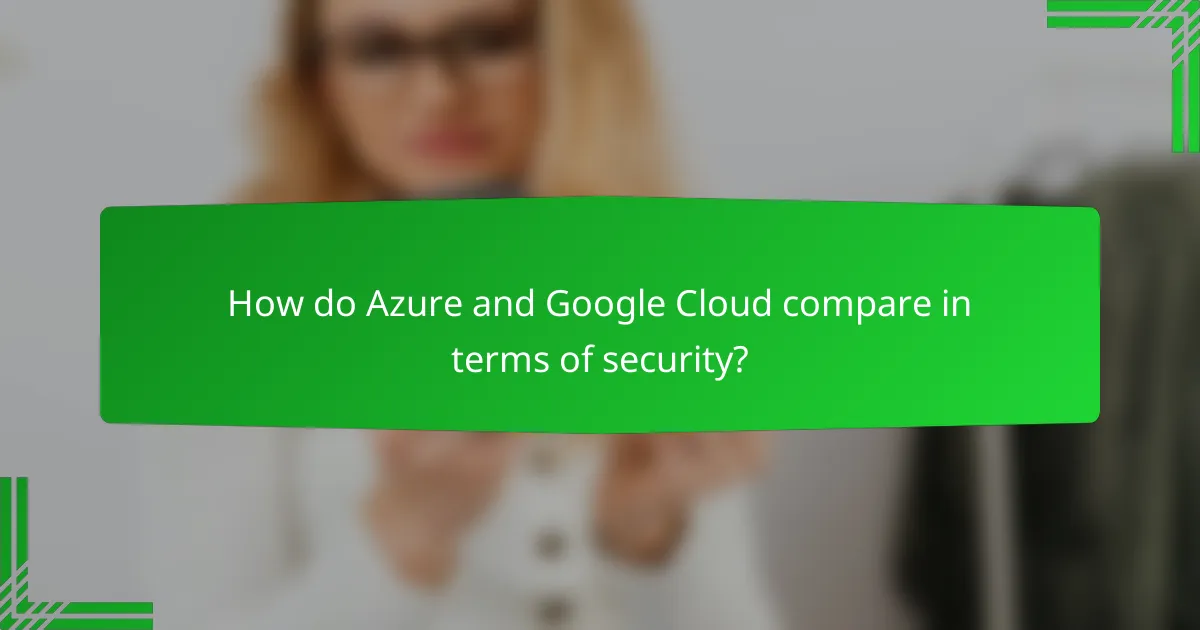
How do Azure and Google Cloud compare in terms of security?
Azure and Google Cloud both prioritize security, offering robust measures to protect data and applications. However, their approaches differ in specific features and compliance, making it essential to evaluate which platform aligns better with your security needs.
Compliance certifications
Both Azure and Google Cloud hold numerous compliance certifications, ensuring they meet various industry standards. Azure is compliant with certifications such as ISO 27001, HIPAA, and GDPR, while Google Cloud also adheres to similar standards, including PCI DSS and FedRAMP. Businesses should assess which certifications are most relevant to their industry and regulatory requirements.
When selecting a cloud provider, consider the specific compliance needs of your organization. For example, if your business operates in healthcare, HIPAA compliance may be critical, making Azure a strong candidate. Conversely, if your focus is on financial services, both platforms offer PCI DSS compliance, but the specifics of their implementations may influence your choice.
Data encryption methods
Data encryption is a key component of security in both Azure and Google Cloud. Azure employs encryption both at rest and in transit, using technologies like Azure Storage Service Encryption and TLS for data in transit. Google Cloud similarly offers encryption at rest with Google-managed keys and customer-managed keys, along with TLS for data in transit.
When evaluating encryption methods, consider the level of control you need over your encryption keys. Azure allows for customer-managed keys, providing flexibility for organizations that require more stringent key management. Google Cloud also offers this option, but the implementation details may vary, so it’s essential to review each platform’s documentation for specifics.
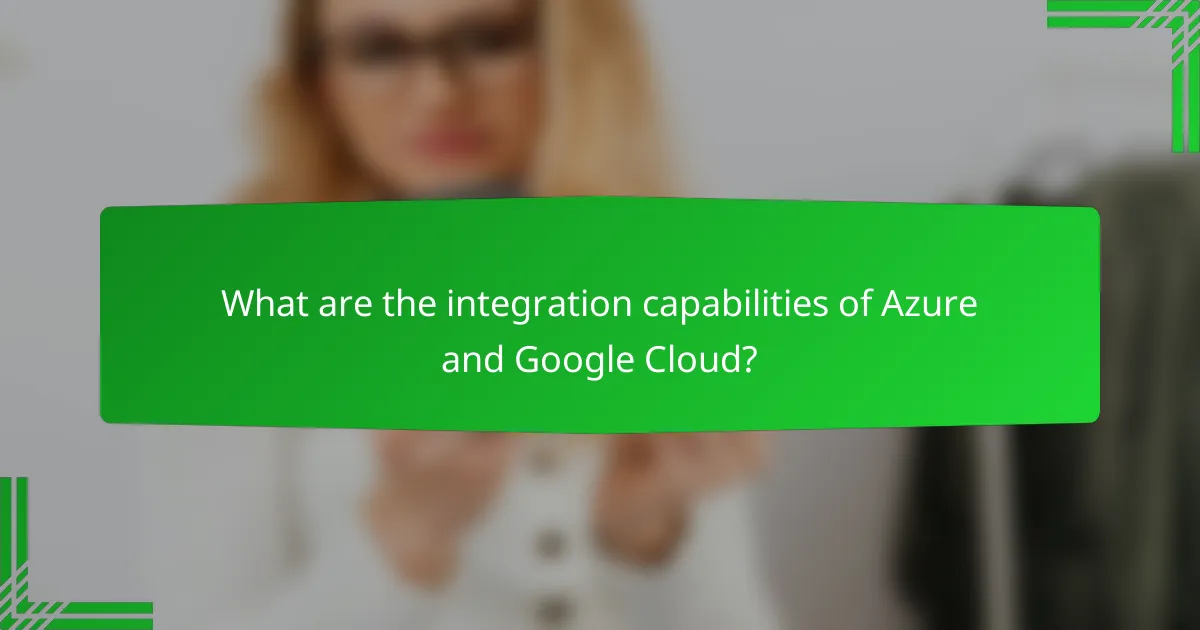
What are the integration capabilities of Azure and Google Cloud?
Azure and Google Cloud offer robust integration capabilities, allowing businesses to connect various applications and services seamlessly. Both platforms support a wide range of integration options, but their approaches and tools may differ, impacting the choice depending on specific needs.
Third-party integrations
Both Azure and Google Cloud provide extensive third-party integration options. Azure integrates well with Microsoft products and services, making it a strong choice for organizations already using tools like Office 365 or Dynamics 365. Google Cloud, on the other hand, excels in integrating with various open-source tools and platforms, appealing to developers and data scientists.
When considering third-party integrations, evaluate the specific applications your organization relies on. Azure’s marketplace features thousands of applications, while Google Cloud’s integration with platforms like GitHub and Slack enhances collaboration and development workflows.
APIs and developer tools
Azure and Google Cloud both offer comprehensive APIs and developer tools to facilitate integration. Azure provides a rich set of APIs through Azure API Management, allowing developers to create, publish, and manage APIs securely. Google Cloud offers similar capabilities with its Apigee platform, which focuses on API analytics and management.
When choosing between the two, consider the development environment and programming languages your team uses. Azure supports a wide range of languages, including .NET and Java, while Google Cloud is often favored for its strong support of Python and data-centric applications. Additionally, both platforms offer SDKs and command-line tools to streamline development processes.
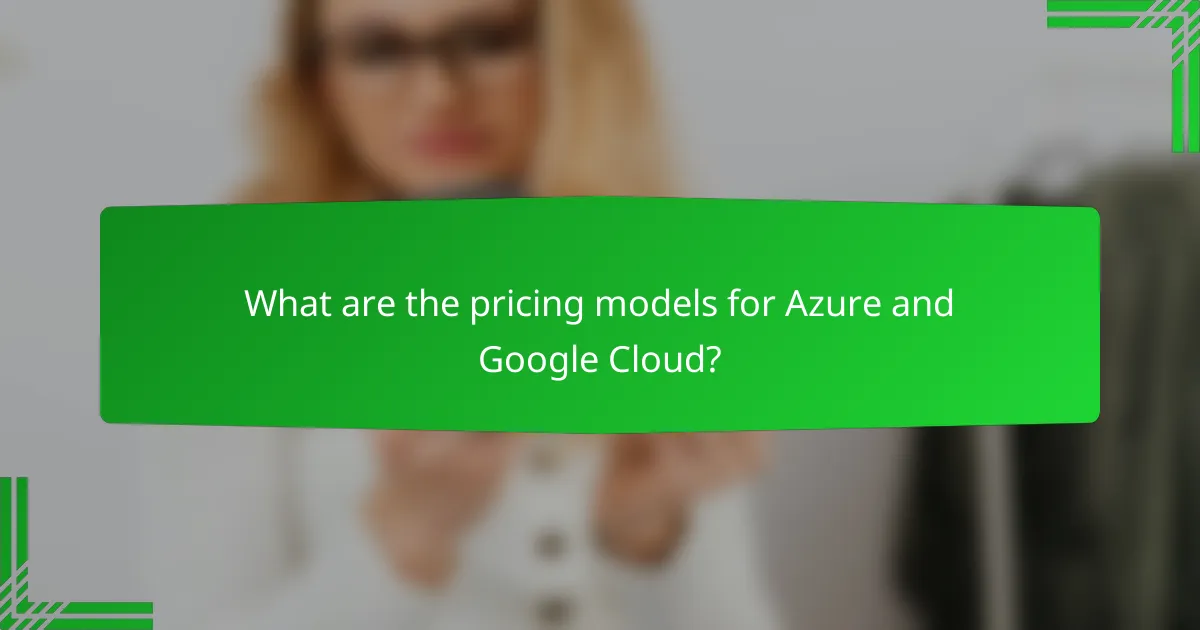
What are the pricing models for Azure and Google Cloud?
Azure and Google Cloud offer flexible pricing models that cater to various business needs. Both platforms provide options such as pay-as-you-go, reserved instances, and committed use discounts, allowing users to choose the most cost-effective approach based on their usage patterns.
Pay-as-you-go options
The pay-as-you-go model allows users to pay only for the resources they consume, making it ideal for businesses with fluctuating workloads. This model provides flexibility and eliminates the need for upfront investments, which can be beneficial for startups or projects with uncertain demand.
In Azure, the pay-as-you-go pricing includes charges for compute, storage, and data transfer, calculated on an hourly or per-second basis. Google Cloud follows a similar approach, with costs based on the specific services used, such as virtual machines or storage solutions.
When using pay-as-you-go options, it’s essential to monitor usage closely to avoid unexpected costs. Setting budgets and alerts can help manage expenses effectively. Additionally, consider the potential savings from switching to reserved instances if your usage becomes more predictable over time.
